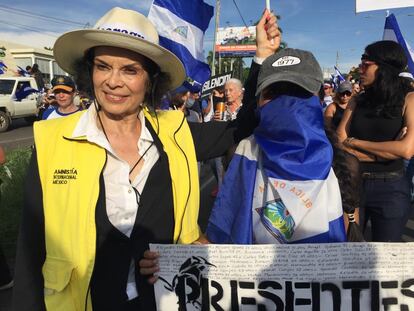Bianca Jagger’s contentious summer: ‘These have not been the quietest months of my life’
Political repression and persecution of clergy in her native Nicaragua has reignited the former actress’ opposition to the Ortega regime

Bianca Jagger hasn’t had much rest this summer. The native Nicaraguan lives in London, but the constant turmoil roiling her home country has her up in arms. The Nicaraguan regime, led by President Daniel Ortega and Rosario Murillo, his wife and vice president, has stepped up its attacks on church clergy. “For years it has relentlessly persecuted journalists, politicians, peasants, human rights activists, priests and bishops,” said Jagger. “But in the last few weeks, the [Ortega-Murillo] dictatorship openly declared war on the Church.”
“These have not been the quietest months of my life,” she says. The attacks on the Church in Nicaragua hit home. Jagger is a Catholic — her Twitter profile reads, “Nicaraguan by the grace of God.” The Ortega-Murillo war on priests, nuns and bishops has intensified her opposition to their regime and also led her to criticize the Church hierarchy’s response. Jagger vehemently denounced the August 19 arrest of Bishop Rolando Alvarez in Matagalpa (Nicaragua). Alvarez has been very vocal in his criticism of the Ortega government and Jagger supports his decision to stay in Nicaragua. Alvarez even asked the Pope to allow him to remain in the country, even though Church leaders tried to convince him to leave discreetly. Alvarez is currently incommunicado. “I understand the Holy Father’s concern for his safety, but they must respect his decision not to leave,” said Jagger. “For me, he is a prophetic, eloquent and very powerful voice. The people of Nicaragua stand behind him.”
She also has concerns about Cardinal Leopoldo Brenes, who presides over the Episcopal Conference of Nicaragua. “I was surprised that he did not condemn the kidnapping,” she told EL PAÍS. Jagger said in a recent tweet, “I am very sad and surprised to see that neither the Episcopal Conference of Nicaragua nor his eminence have issued a statement condemning the violent kidnapping of Monsignor Alvarez and other priests and lay people.”
My mother experienced discrimination and misogyny, and that heavily influenced the way she raised meBianca Jagger
Jagger says there are close to 200 political prisoners in Nicaragua. “Many of them have been tortured, including Dora Maria Tellez, the former “Commander Two” of the Sandinistas. Others have died mysteriously in prison, such as Hugo Torres Jiménez an army general who was known as “Commander One”. “They [Ortega and Murillo] have no limits,” and will stop at nothing, says the founder of the Bianca Jagger Human Rights Foundation.
Bianca Jagger is on a mission to safeguard human rights around the world. “Not just with what’s happening in my native country, but also now with the Russian invasion of Ukraine and the situation of women in Afghanistan. And before that, I was very much against Brexit.” Jagger, who holds dual Nicaraguan and British citizenship, strongly opposes “Boris Johnson and those who supported the decision to strip us of our place in the European Union.”
She is very active on Twitter and says, “I post messages in English, Spanish, French and sometimes Portuguese.” Before the pandemic, Jagger was often seen demonstrating against human rights abuses, but must now protest from home. “I was categorized as an at-risk [for Covid] individual, so I’ve been isolating for two and a half years,” she says in a phone conversation from her London home. Home confinement has made her work much more difficult. “Going places to bear witness is fundamental to what we do.” One of the last times she was able to travel was to Nicaragua in 2018, when Jagger accompanied an Amnesty International delegation led by its America Region head, Erica Guevara Rosa. “I never stopped going back to my country,” says Jagger, which is how she was able to closely monitor the regime that has led the Nicaraguan people toward disaster.
Bianca Jagger’s mother, Dora Macías, warned her early on about Daniel Ortega. “She became disillusioned with Ortega very quickly. She had been a courageous opponent of the Somoza regime and supported the revolution. But she soon became critical of certain behaviors, and sought asylum in the United States in 1982,” said Jagger. “What happened in Nicaragua was a popular insurrection led by students, peasants, workers, businesspeople and, of course, the Sandinista guerrillas. But then the Ortega family hijacked this popular uprising from every social class. It was known all over the world as the Sandinista revolution, but it was really the Nicaraguan revolution.”
The former actress did not share her mother’s rapid disillusionment with the new Ortega-led Sandinista government. Jagger wasn’t living in Nicaragua at the time, and didn’t believe what people back home were saying. She openly opposed President Reagan’s backing of the “Contra” fighters that fought the Sandinistas, but she did talk to Contra leaders to understand their position. “My mother and I argued a lot about it, but I finally had to admit it. Ortega is a traitor to everything he once claimed to stand for; he sold out his country.”
Social activism was ingrained in Bianca at a young age by her mother, who separated from Bianca’s father when their daughter was 10 years old. “I lived with the stigma of being the daughter of a divorced woman in 1960s Nicaragua; that affected us. My mother experienced discrimination and misogyny, and that heavily influenced the way she raised me.” But Dora Macias never gave up. “She didn’t have much higher education but became a very politically aware woman. From early on, she taught me the importance of democratic values, the defense of human rights and the environment, and freedom of the press. She was my inspiration.” So much so that it led Bianca to apply for a scholarship to study at the Paris Institute of Political Studies, commonly known as “Sciences Po”, a renowned university that has produced seven French presidents and twelve heads of government from other countries.
Icon of the 1970s cultural revolution
In the 1970s, Bianca Pérez-Mora Macías became an actress and committed political activist who championed human rights and challenged the establishment, and was soon regarded as one of the icons of the 1970s cultural revolution. She married Mick Jagger in 1971 and gave birth to their daughter Jade that same year. When Bianca and Mick divorced in 1979, she dedicated herself to the cause of human rights.
With seeming disregard for threats and personal risk, Bianca has traveled to dangerous places like the Salvadoran refugee camp in Honduras that she visited with a US congressional delegation in 1981 to hear first-hand testimony about the death squads and paramilitary groups in El Salvador. Or her trip to Bosnia and Kosovo, where she denounced Serbian war crimes during the Yugoslav Wars of the 1990s. “Those are two times when I must admit that I feared for my life,” said Jagger. But she hasn’t given up, even now during her contentious summer of 2022.
Tu suscripción se está usando en otro dispositivo
¿Quieres añadir otro usuario a tu suscripción?
Si continúas leyendo en este dispositivo, no se podrá leer en el otro.
FlechaTu suscripción se está usando en otro dispositivo y solo puedes acceder a EL PAÍS desde un dispositivo a la vez.
Si quieres compartir tu cuenta, cambia tu suscripción a la modalidad Premium, así podrás añadir otro usuario. Cada uno accederá con su propia cuenta de email, lo que os permitirá personalizar vuestra experiencia en EL PAÍS.
¿Tienes una suscripción de empresa? Accede aquí para contratar más cuentas.
En el caso de no saber quién está usando tu cuenta, te recomendamos cambiar tu contraseña aquí.
Si decides continuar compartiendo tu cuenta, este mensaje se mostrará en tu dispositivo y en el de la otra persona que está usando tu cuenta de forma indefinida, afectando a tu experiencia de lectura. Puedes consultar aquí los términos y condiciones de la suscripción digital.









































